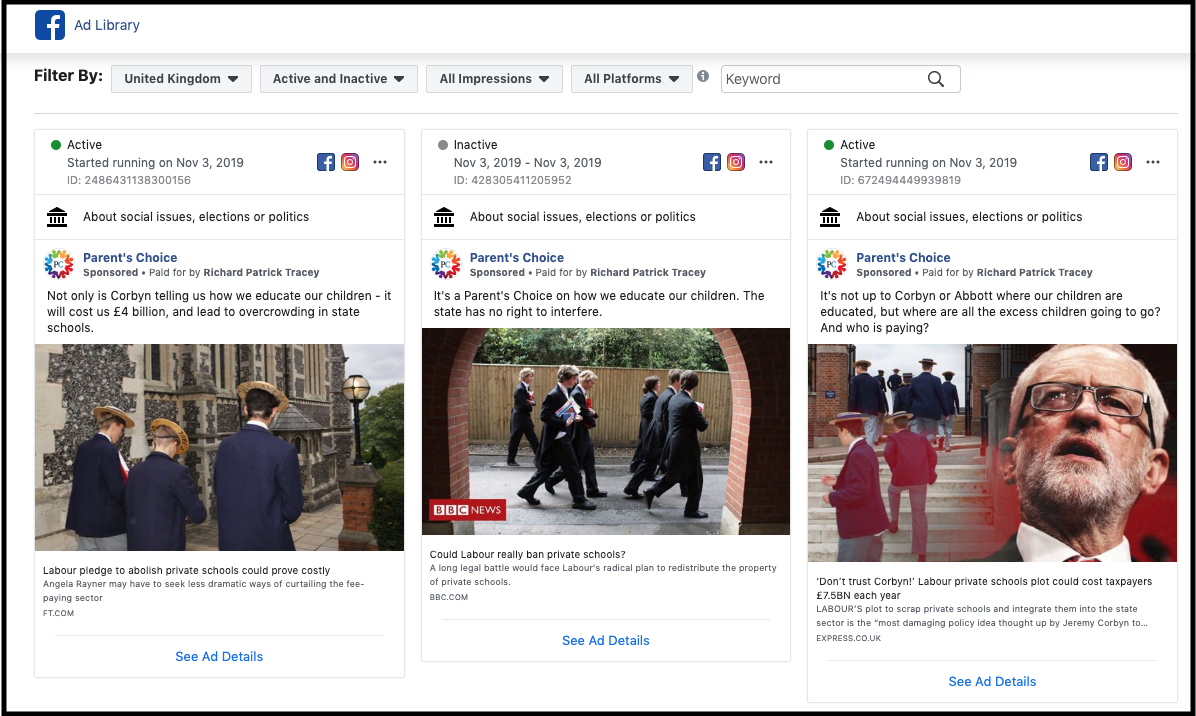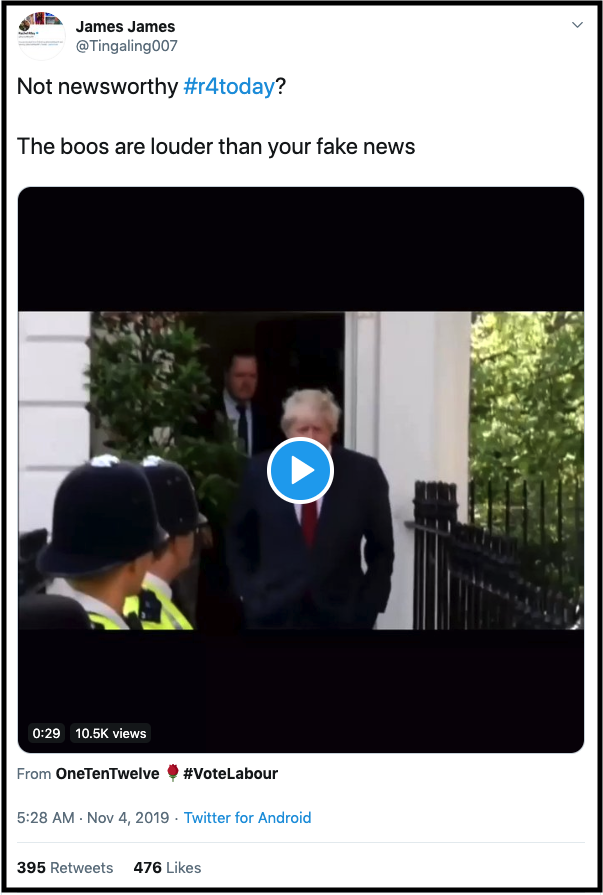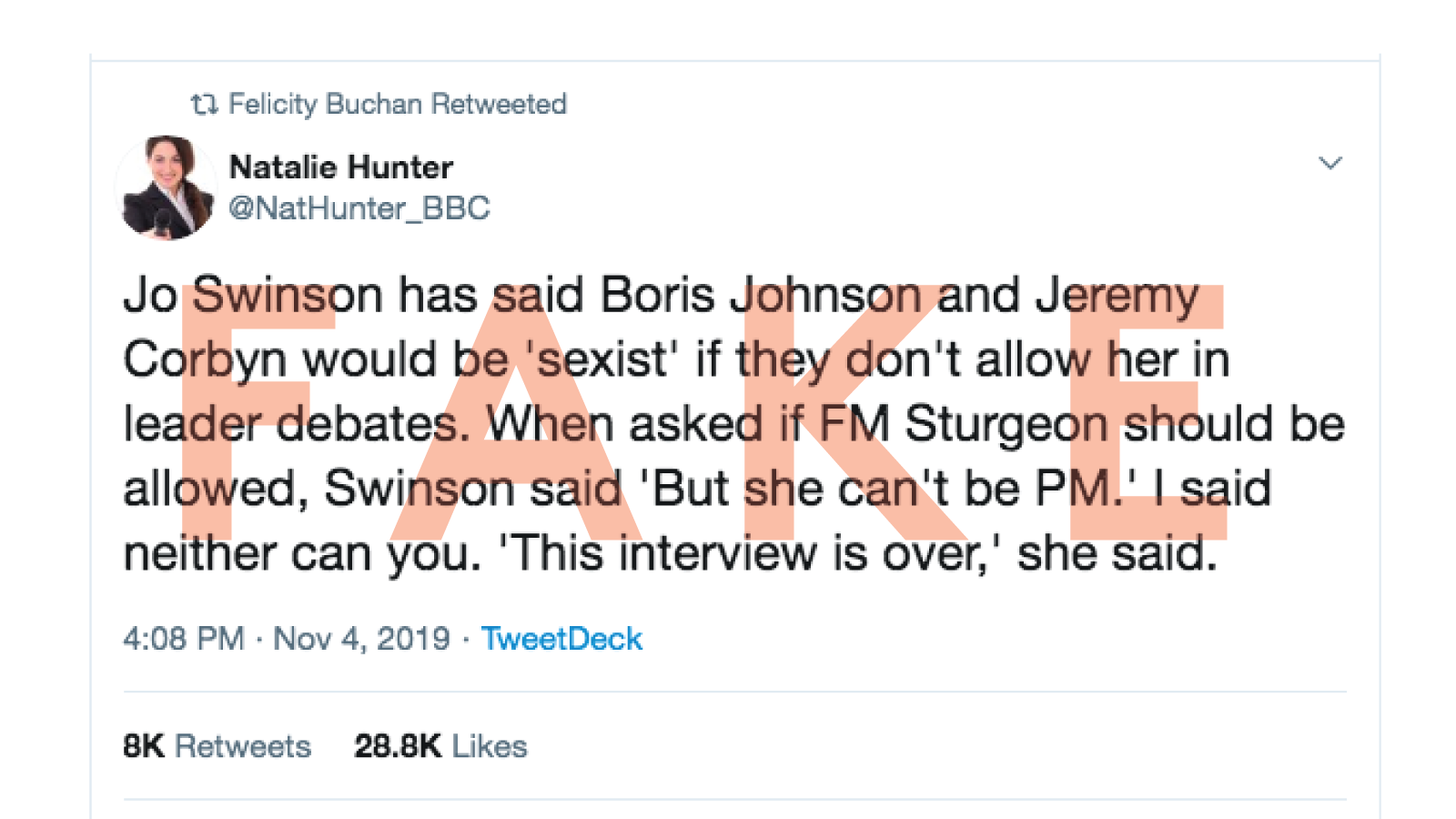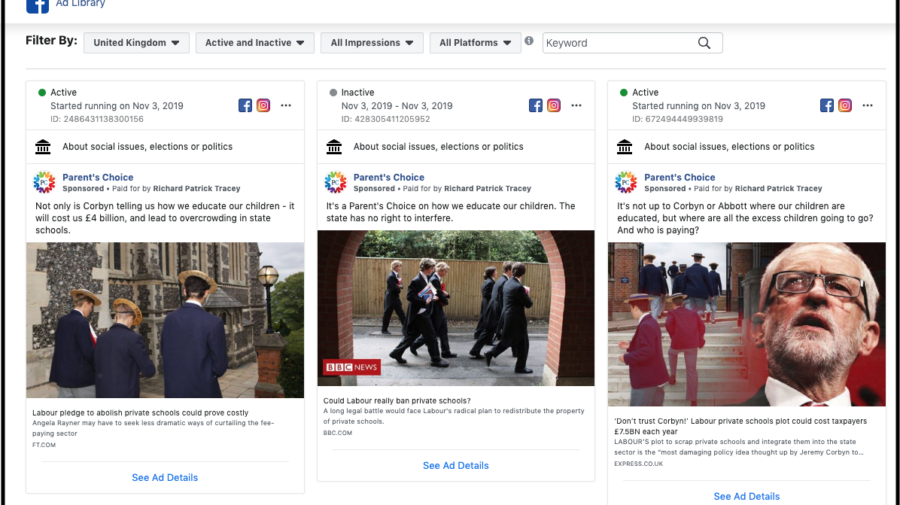Welcome to the first of CrossCheck UK’s weekly roundups around the 2019 UK General Election. For those paying attention to elections, disinformation and media manipulation, the campaign could not have got off to a more predictable start.
Among the main investigations were a doctored video shared by the Conservatives, a Labour candidate for Speaker accused of an assertion she had never made, and the Liberal Democrats “misleading” use of charts on their promotional leaflets. Here are just some of the stories First Draft dug into over the first days of the campaign trail.
Parent’s Choice
A former Conservative minister funded Facebook adverts attacking Jeremy Corbyn and the Labour Party policy on private schools through a Facebook Page called Parent’s Choice.
Parent’s Choice was created on October 11 in the ‘community’ category of Facebook Pages without any website being linked to it. When the ads were first published, on Saturday Novermber 3, the Facebook Page had a few hundred followers. Nevertheless, the ads reached more than 15,000 people according to figures in Facebook’s Ad Library, with a little over £100 spent.
They were labelled as “Paid for by Richard Patrick Tracey”, who was previously the Conservative MP for Surbiton and minister for sport under Margaret Thatcher. He retired from the London Assembly, where he was in 2016.

The ads promoted by a former Conservative minister took aim at Labour’s education plans. Screenshot by author.
Mr Tracey’s association with the Conservative Party, where he is still a member, was not made clear anywhere on the Page or advert and our research powered this report by Sky News.
Sky’s Alexander Martin reported: “[Tracey] said he was running the ads as an individual because he thought it was ‘offensive that anybody in politics or anywhere else’ would attempt to infringe on parents’ freedom of choice over how to educate their children.”
Another old Boris Johnson video
On Monday, we noticed an old video of Boris Johnson shared on Twitter with the caption: “Not newsworthy #r4today? The boos are louder than your fake news.”
The tweet has almost 400 retweets at the time of writing and the video has been viewed more than 10,000 times. But the clip was filmed on June 24, 2016, the day after the EU Referendum, and shows him being booed by a crowd outside his home. The footage was widely shared on social and broadcast news at the time.

The video from 2016 was presented as new on Monday. Screenshot by author.
By doing a reverse image search of a screenshot from the clip, we found multiple articles crediting the 2016 video to Reuters, as well as other clips of the event from other outlets like AFP.
Old pictures and videos taken out of context are a common tactics of disinformation and this is not the first time an old video of Johnson has resurfaced during his time as Prime Minister.
In September, a four-year-old video of Johnson being pelted with balls was shared by a Twitter user with over 100,000 followers with the caption “Scum attack our Prime Minister.”
Harriet Harman’s history
A Facebook post by the hyperpartisan website Nye Bevan News took aim at MP Harriet Harman on November 4, who was on the ballot for Speaker of the House of Commons that day and will be standing to remain in her south London seat of Camberwell and Peckham come election day.
The post contained misleading claims about her involvement with the Paedophile Information Exchange in the 1970s, when she was legal officer for the National Council for Civil Liberties (NCCL). The National Council for Civil Liberties at the time gave “affiliate” status to the Paedophile Information Exchange.
The meme claimed that Harman said “childhood sexual experiences willingly engaged with an adult result in no identifiable harm”. In fact, this is a quote from a NCCL document written in 1976 – two years before Harman joined the organisation.
Harman did say “images of children should only be considered pornographic if it could be proven the subject suffered”, another quote attributed to the Labour grandee by Nye Bevan News. However, the quote is missing context: Harman says she was arguing for an amendment to guard against unintended consequences, like parents being criminalised for taking pictures of their children on the beach or in the bath.
All the quotes came from the 1970s but the post makes no reference to date. The post was later removed.
Keir Starmer’s doctored ‘stumble’
On Tuesday the Conservative Party shared a doctored video of shadow Brexit secretary Keir Starmer which edited out his answer to a question on Labour’s plans for leaving the EU. The video was promoted on the party’s official Twitter and Facebook Pages.
In the original video, Good Morning Britain host Piers Morgan asks “Why would the EU give you a good deal?” and Starmer responds immediately. In the Conservatives’ version, footage of the Labour frontbencher listening to the question plays for five seconds after Morgan’s question and then the video ends. The discrepancy was noticed on Twitter by BBC journalist Daniel Sandford.
The Conservatives published a statement confirming that the interview had happened but did not address the controversy. Good Morning Britain published a side-by-side version of the videos debunking the manipulated version.
Conservative party chairman James Cleverly defends the edited campaign video of Labour MP Sir Keir Starmer’s interview on GMB saying ‘we clipped the video to make it shorter because Keir’s answers rambled on.’ pic.twitter.com/kktBSFgbXz
— Good Morning Britain (@GMB) November 6, 2019
Facebook addressed the video in a call with reporters. “Ads from political parties and political candidates are not subject to our fact-checking rules,” said Rebecca Stimson, Facebook’s Head of UK Public Policy, according to Reuters although the video was not promoted as an advert.
Fake BBC account
On Tuesday a parody BBC account took aim at Jo Swinson and received over 8,000 retweets – including by Felicity Buchan, the Conservative candidate for the marginal seat of Kensington. The fake account purported to be “the chief political correspondent for BBC Scotlandshire”, included “BBC” in its handle and used a cover image of the BBC newsroom.
Swinson had previously questioned whether her exclusion from the leaders’ debate was motivated by sexism, which may have lent some credibility to the widely-shared tweet. After being contacted by First Draft, Buchan retracted the retweet, explaining that she’d shared it “in the sincere belief it was a genuine BBC reporter and a genuine interview”.
The fake Twitter account has since been suspended.

This fake BBC account has since been suspended. Screenshot by author.
Lib Dem leaflets
The Lib Dems have been at the centre of wide-ranging controversy related to their promotional leaflets around the country this week. It began with a misleading poll about Bath and North East Somerset, Jacob Rees-Mogg’s constituency, shared on Twitter by the local Lib Dem group on October 30.
The poll showed the Lib Dems just six points behind the Conservatives’ 38%, with Labour trailing at 8%. However, the question the number pertained to, written in small print underneath the graph read: “Imagine that the result of your constituency was expected to be very close between the Conservative and Liberal Democrat candidate, and none of the other parties was competitive. In this scenario, which party would you vote for?”’
If we work together, and back @nickcoatesnes we will beat Jacob Rees-Mogg in North East Somerset #VoteNickCoates #StopMogg pic.twitter.com/ymubNsMVg8
— BathNES Lib Dems ? (@bathnesld) October 30, 2019
This reflected a wider trend in local-level campaigning from the party, in which polls are presented in a way that could be deemed misleading. Another out-of-scale chart emerged on Wednesday, from Durham.
Separately, on Monday leaflets with polls captioned “YouGov/Flavible” appeared online in constituencies like Weston-super-Mare and Oxford East. One of the leaflets said that the Lib Dems were polling “ahead of Labour nationally” and offered projections by Flavible Politics and YouGov. First Draft found no evidence that the Lib Dems were polling ahead of Labour nationally at the time.
YouGov told First Draft that they do not do voting intention breakdowns by constituency – only nationally. They said that Flavible Politics took the results from national voting intention polling and made their own predictions on that basis. Additionally, YouGov distanced themselves from the figures or the methodology in the polls for Weston-Super-Mare and Oxford East. The link to YouGov’s methodology is online.
On Wednesday, Flavible Politics distanced themselves from the Lib Dems flyers, calling them “blatantly [sic] misinforming labelling”.
Contacted by First Draft, a Flavible Politics spokesperson said: “I don’t see a single projection in September with these numbers” and described the figures on the leaflet as “misleading labelling”. The company later shared a statement denouncing “the misuse of Flavible data”.
Clea Skopeliti, Bethan John and Alastair Reid also contributed to this report.
Interested in becoming a CrossCheck partner? Get in touch.
Stay up to date with First Draft’s work by becoming a subscriber and follow us on Facebook and Twitter.






